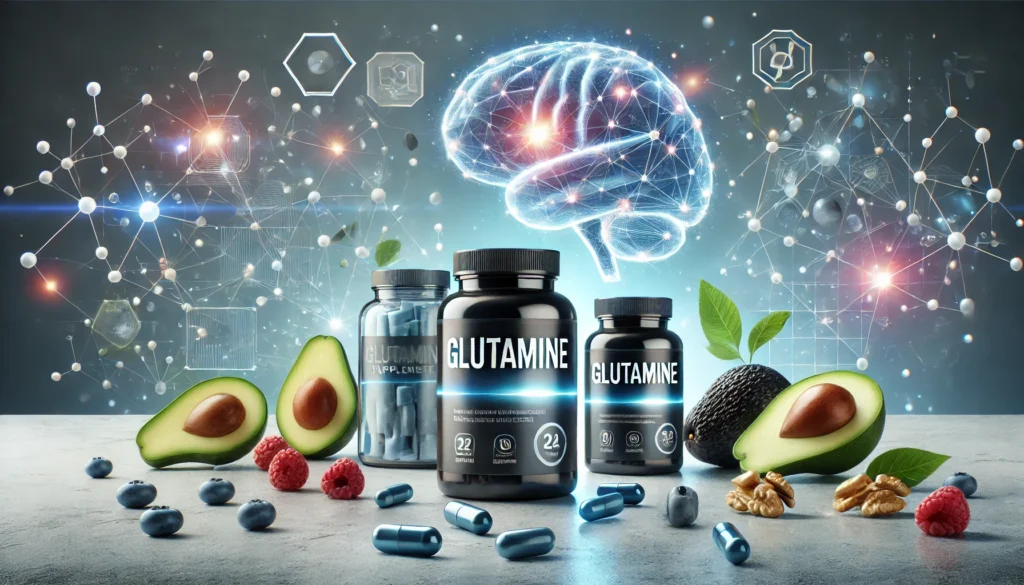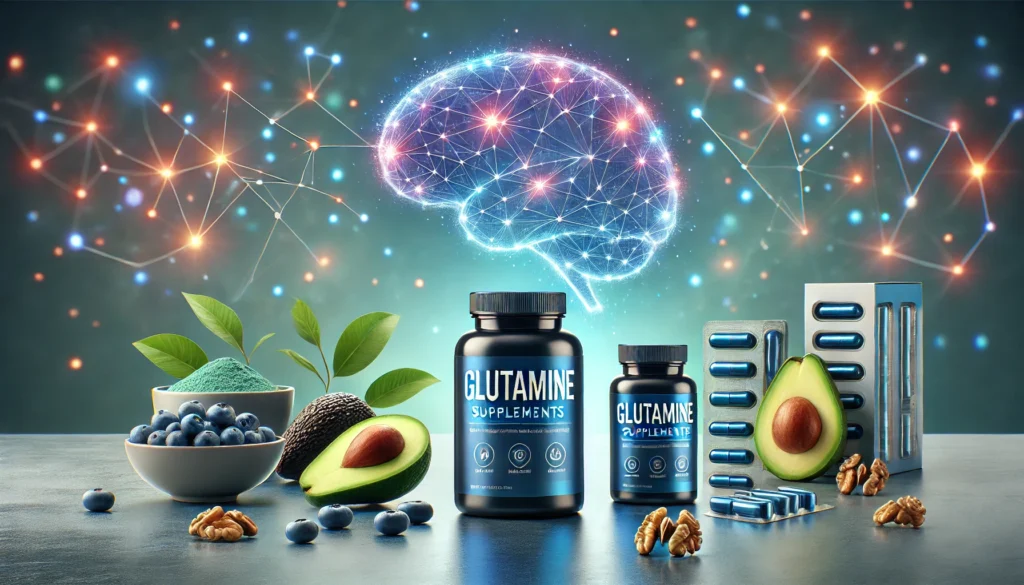Glutamine, a non-essential amino acid, plays a pivotal role in various physiological processes within the body, particularly in the brain. It is the most abundant amino acid in the bloodstream and is critical for protein synthesis, immune function, and nitrogen transport. With the growing interest in nootropic substances—compounds that enhance cognitive function—glutamine has garnered attention for its potential cognitive benefits.
This article provides a comprehensive analysis of glutamine, discussing its sources, chemistry, physiological mechanisms, potential nootropic benefits, dosage guidelines, side effects, interactions with other substances, and other important considerations for safe supplementation.
You May Also Like:
L-Glutamine: Benefits, Dosage, Side Effects, Drug Interactions, and Other Important Information
Sources of Glutamine
Glutamine is naturally synthesized in the body, primarily in the muscles, and can also be obtained through dietary sources. Major food sources rich in glutamine include:
- Animal-based foods: Chicken, beef, fish, eggs, and dairy products are excellent sources of glutamine, providing significant amounts necessary for daily functioning.
- Plant-based foods: Beans, lentils, spinach, cabbage, and nuts also contribute to glutamine intake, although in lower concentrations compared to animal sources.
- Supplementation: Glutamine supplements are widely available in powder or capsule form, often marketed to athletes and individuals recovering from surgery or illness.
While most individuals can meet their glutamine needs through a balanced diet, certain conditions—such as intense physical stress, injury, or illness—may necessitate increased glutamine intake, which can be achieved through supplementation.

Chemistry of Glutamine
Chemically, glutamine is classified as an α-amino acid, characterized by the presence of both an amino group (−NH2) and a carboxyl group (−COOH). It is distinguished from other amino acids by its side chain, which contains an amide group. The molecular formula of glutamine is C5H10N2O3, and its structure includes an α-carbon atom attached to an amino group, a carboxyl group, a hydrogen atom, and a variable side chain (the amide group).
Glutamine serves as a precursor for several critical biomolecules, including:
- Glutamate: A key neurotransmitter in the central nervous system that plays an essential role in synaptic plasticity, learning, and memory.
- Gamma-aminobutyric acid (GABA): An inhibitory neurotransmitter that helps regulate neuronal excitability and may contribute to anxiety reduction.
Glutamine’s versatility as a building block for various amino acids and neurotransmitters underscores its significance in both metabolic and neurological functions.
Physiological Mechanisms of Glutamine in the Body and Brain
Glutamine is involved in numerous physiological processes that are crucial for maintaining overall health and cognitive function. Some key mechanisms include:
- Nitrogen Transport: Glutamine is vital for transporting nitrogen between tissues, which is essential for amino acid synthesis and the production of nucleotides. This process is particularly important during periods of rapid growth, recovery from illness, or intense physical training.
- Energy Production: In times of stress, such as intense exercise or illness, glutamine can be converted into glucose through gluconeogenesis, providing an alternative energy source for cells. This energy is critical for sustaining cellular functions, especially in the brain, where glucose is the primary energy substrate.
- Neurotransmitter Precursor: As mentioned, glutamine is a precursor to both glutamate and GABA. This dual role is essential for maintaining the balance between excitation and inhibition in the brain, which is necessary for optimal cognitive function and emotional regulation.
- Immune Function Support: Glutamine is crucial for the proliferation and function of lymphocytes and macrophages, which are vital components of the immune system. Maintaining adequate glutamine levels can enhance immune responses, particularly during times of stress or illness.
- Gut Health: Glutamine serves as a primary fuel source for intestinal epithelial cells, supporting gut integrity and function. A healthy gut barrier is crucial for preventing the translocation of harmful substances that could negatively affect cognitive function.

Nootropic Benefits of Glutamine
Glutamine’s potential nootropic benefits stem from its multifaceted role in brain metabolism, neurotransmitter balance, and overall cognitive health. Although research is still emerging, several potential benefits of glutamine as a nootropic supplement include:
- Enhanced Cognitive Performance: Glutamine supplementation may support cognitive performance during periods of stress or fatigue by providing a readily available source of energy for brain cells. This benefit can be particularly relevant for individuals engaging in intense physical training or facing demanding mental tasks.
- Mood Stabilization: The relationship between glutamine and neurotransmitter balance can contribute to mood regulation. By serving as a precursor for both glutamate and GABA, glutamine supplementation may help stabilize mood and alleviate symptoms of anxiety and depression, which can indirectly improve cognitive performance.
- Memory Improvement: Emerging evidence suggests that glutamine’s role as a precursor to glutamate may enhance synaptic plasticity, a critical factor in memory formation and learning. While more research is needed to establish a direct link between glutamine supplementation and memory enhancement, preliminary studies indicate promising potential.
- Stress Resilience: Glutamine may help mitigate the cognitive effects of stress by supporting energy production and neurotransmitter balance during times of increased demand. This resilience can lead to better focus, improved cognitive flexibility, and enhanced overall mental performance.
- Neuroprotection: Some studies suggest that glutamine may have neuroprotective properties due to its role in reducing oxidative stress and inflammation. By protecting brain cells from damage, glutamine could potentially slow cognitive decline associated with aging or neurodegenerative diseases.

Dosage and Supplementation Guidelines
Determining the appropriate dosage of glutamine for cognitive enhancement can be challenging due to the variability in individual needs and health conditions. However, general guidelines can help inform safe and effective supplementation:
- General Dosage: For healthy adults, a typical dosage range for glutamine supplementation is between 5 to 10 grams per day. This dosage is generally considered safe and can be adjusted based on individual response and specific health needs.
- Athletic Performance: Athletes may benefit from higher dosages, typically ranging from 10 to 20 grams per day, particularly during periods of intense training or recovery. It is advisable to divide these doses into multiple servings throughout the day to optimize absorption and effectiveness.
- Supplement Forms: Glutamine is available in various forms, including powders, capsules, and tablets. Powders are often favored for their versatility, allowing users to easily mix them into beverages or protein shakes.
- Timing: For cognitive enhancement, taking glutamine before mentally demanding tasks or during stressful situations may yield optimal benefits. Athletes often consume glutamine post-workout to support recovery and replenish glutamine levels.
- Safety Considerations: While glutamine is generally considered safe for most individuals, it is essential to adhere to recommended dosages and consult a healthcare provider, especially for those with pre-existing health conditions or those taking medications.
Side Effects and Safety
Glutamine supplementation is typically well-tolerated, but some individuals may experience mild side effects, especially at higher doses. Potential side effects include:
- Gastrointestinal Distress: Some users may experience nausea, diarrhea, or stomach cramps when taking glutamine, particularly in high doses. Starting with a lower dose and gradually increasing it can help minimize these effects.
- Allergic Reactions: While rare, allergic reactions to glutamine may occur, manifesting as rashes, itching, or swelling. Individuals with known sensitivities should exercise caution and consult a healthcare provider before using glutamine supplements.
- Interaction with Other Amino Acids: Excessive glutamine supplementation may alter the balance of other amino acids in the body. It is essential to consider overall protein intake and ensure a balanced amino acid profile.

Interactions with Other Supplements and Medications
Glutamine may interact with several medications and supplements, potentially affecting their efficacy or safety. It is crucial to understand these interactions to avoid complications:
- Chemotherapy Drugs: Some studies suggest that glutamine supplementation may help reduce the side effects of certain chemotherapy agents. However, this interaction is complex and can vary based on individual treatment regimens. Patients undergoing cancer treatment should consult their oncologist before adding glutamine to their regimen.
- Anticonvulsants: Glutamine’s role as a neurotransmitter precursor may influence the effectiveness of anticonvulsant medications. Individuals taking these medications should monitor their glutamine intake and consult their healthcare provider for guidance.
- BCAAs (Branched-Chain Amino Acids): Glutamine is often taken in conjunction with BCAAs to support muscle recovery and performance. However, excessive intake of BCAAs could alter glutamine metabolism, so it’s essential to balance these supplements.
- Other Nootropics: Glutamine can be safely combined with other nootropic supplements, such as Rhodiola rosea or Bacopa monnieri, to enhance cognitive function. However, individuals should be mindful of potential cumulative effects and monitor their responses to these combinations.
Risks for Individuals with Certain Health Conditions
While glutamine is generally safe, certain health conditions may require caution when using this supplement:
- Kidney Disease: Individuals with compromised kidney function should be cautious with glutamine supplementation, as excessive intake could exacerbate symptoms or lead to further kidney impairment. It is crucial to consult a healthcare provider before use.
- Liver Disease: Glutamine metabolism occurs in the liver, and individuals with liver disease may have altered processing of this amino acid. Moderation and medical supervision are advised for those with liver conditions.
- Seizure Disorders: Since glutamine can influence neurotransmitter balance, individuals with a history of seizures should consult their healthcare provider before starting supplementation, as it may interact with anticonvulsant medications.
- Pregnancy and Lactation: Pregnant and breastfeeding women should exercise caution when using glutamine supplements and consult a healthcare provider for tailored advice.
Should You Consider Glutamine as a Nootropic?
Glutamine is a versatile amino acid with a wide range of potential benefits, particularly concerning cognitive function and overall health. Its role as a neurotransmitter precursor, energy source, and immune system supporter highlights its importance in maintaining optimal brain health. While glutamine supplementation may offer cognitive benefits, it is essential to adhere to recommended dosages and consult healthcare professionals, especially for individuals with underlying health conditions or those taking medications. As research on glutamine continues to evolve, its status as a nootropic supplement may gain further recognition, paving the way for enhanced cognitive performance and overall well-being.

References:
- GlutamineL-glutamine. Retrieved from: https://www.mountsinai.org/health-library/supplement/glutamine
- Glutamine – Uses, Side Effects, and More. Retrieved from: https://www.webmd.com/vitamins/ai/ingredientmono-878/glutamine
- Glutamine Supplementation Prevents Chronic Stress-Induced Mild Cognitive Impairment. Retrieved from: https://pmc.ncbi.nlm.nih.gov/articles/PMC7230523/
- The Role of Glutamine Homeostasis in Emotional and Cognitive Functions. Retrieved from: https://www.mdpi.com/1422-0067/25/2/1302
- Glutamine metabolism and optimal immune and CNS function. Retrieved from: https://www.cambridge.org/core/journals/proceedings-of-the-nutrition-society/article/glutamine-metabolism-and-optimal-immune-and-cns-function/97AFF4279394640023BE5F9D6635A8C3
- The Role of Glutamine in the Complex Interaction between Gut Microbiota and Health: A Narrative Review. Retrieved from: https://pmc.ncbi.nlm.nih.gov/articles/PMC6834172/
Important Note: The information contained in this article is for general informational purposes only, and should not be construed as health or medical advice, nor is it intended to diagnose, prevent, treat, or cure any disease or health condition. Before embarking on any diet, fitness regimen, or program of nutritional supplementation, it is advisable to consult your healthcare professional in order to determine its safety and probable efficacy in terms of your individual state of health.
Regarding Nutritional Supplements Or Other Non-Prescription Health Products: If any nutritional supplements or other non-prescription health products are mentioned in the foregoing article, any claims or statements made about them have not been evaluated by the U.S. Food and Drug Administration, and such nutritional supplements or other health products are not intended to diagnose, treat, cure, or prevent any disease.


